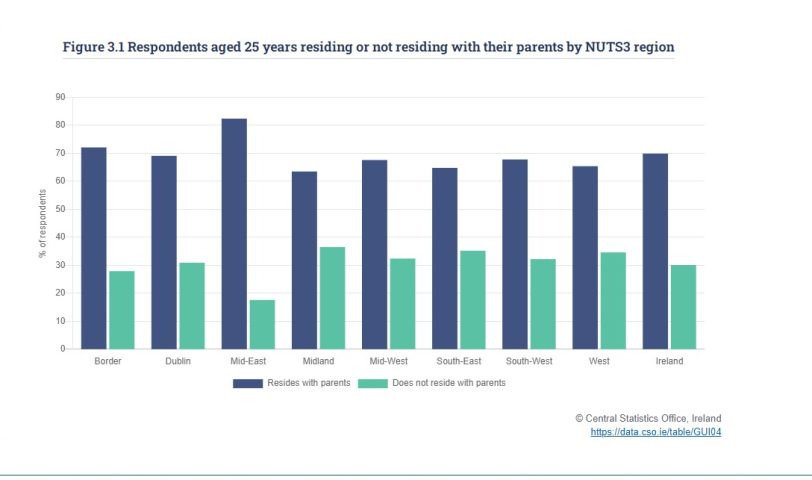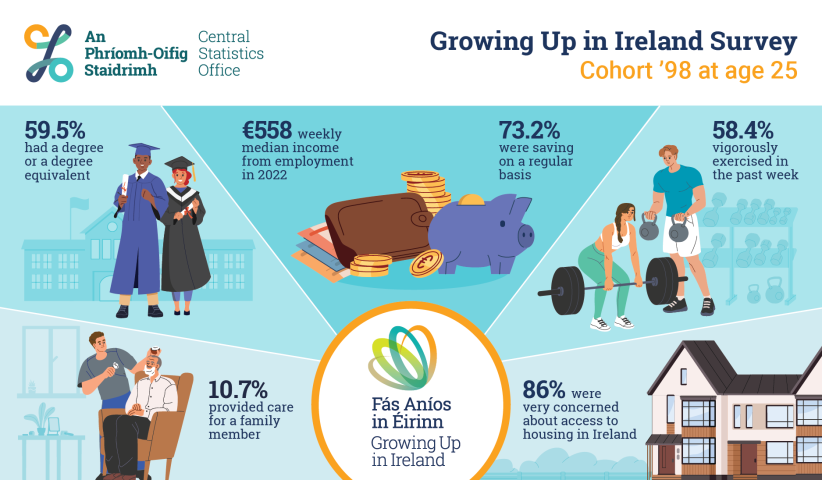New figures from the Central Statistics Office show that one in eight (12.7%) of 25 year olds taking part in the Growing Up in Ireland Cohort had emigrated, with roughly 60% of those having travelled to either the UK or Australia.
At age 25, almost seven in ten (69.9%) of those living in Ireland were still living in the parental home, with this being a consistent pattern observed throughout the country.
This ranged from 63.5% of respondents in the Midlands (Laois, Longford, Offaly, Westmeath) still living at home, to 82.4% of respondents in the Mid-East region (Kildare, Louth, Meath, Wicklow, the CSO found.

Of respondents still living in the parental home, more than six in ten (62.4%) were doing so for mostly financial reasons. Just 3.8% of respondents said they owned their own home, according to the CSO.
86% of respondents are very concerned about access to housing in Ireland – while just over one-third (34.2%) of Cohort ’98 – thus described as they were born in 1998 – said they had difficulties making ends meet.
Women experienced higher levels of economic hardship: they reported difficulties making ends meet and skipping meals for financial reasons more frequently than men (24.5% compared with 14.5%). However, overall nearly two-thirds (65.8%) of 25-year olds stated they found it very easy to fairly easy to make ends meet

Despite concerns about access to housing, four-fifths (80.5%) expected to buy a home in the future. Of those who were living independently, 58.0% rented on the commercial market, with smaller numbers renting from a family member (8.0%) or living rent free (11.1%).
Less than one-eighth (12.0%) of those living independently were homeowners.
The majority (85.5%) of the group were in regular employment, earning a median weekly salary of €558. However, differences in earnings between those with and without a degree were noticeable. Respondents with a degree earned €613 a week compared with €485 a week for those without a degree, the CSO noted.
While almost nine in ten (89.1%) respondents said they had good to excellent health, exactly a quarter of respondents (25.0%) said they had been diagnosed with depression or anxiety.
Across a wide variety of health metrics – diagnosed conditions, depression, anxiety and self-esteem – women and especially women without a higher education reported more negative outcomes.
Figures for mental health metrics – stress, self-esteem and depression and anxiety – have declined since this cohort was aged 20.
Growing Up in Ireland is a national, longitudinal study of children and young people in Ireland and is a collaborative programme of work between the CSO and the Department for Children, Equality, Disability, Inclusion, and Youth (DCEDIY).
Today’s CSO release presents the main results describing the lives of 25-year-olds in GUI, from the central survey themes of physical health, well-being and key relationships, education, civic participation, and economic participation